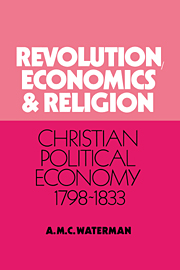Crossref Citations
This Book has been
cited by the following publications. This list is generated based on data provided by Crossref.
Almodovar, António
1970.
CLASSE DE LETRAS - SESSÃO DE 21 DE JULHO DE 2011. Da economia política cristã à ciência social católica − elementos para uma história do pensamento económico católico (1832-1959).
Iberian Journal of the History of Economic Thought,
Vol. 4,
Issue. 1,
p.
29.
Clark, J. C. D.
1989.
England's Ancien Regime as a Confessional State.
Albion,
Vol. 21,
Issue. 3,
p.
450.
Waterman, A.M.C.
1991.
The Intellectual Context ofRerum Novarum.
Review of Social Economy,
Vol. 49,
Issue. 4,
p.
465.
WATERMAN, A. M. C.
1992.
ANALYSIS AND IDEOLOGY IN MALTHUS'S ESSAY ON POPULATION*.
Australian Economic Papers,
Vol. 31,
Issue. 58,
p.
203.
Winch, Donald
1993.
Robert Malthus: Christian Moral Scientist, Arch-Demoralizer or Implicit Secular Utilitarian?.
Utilitas,
Vol. 5,
Issue. 2,
p.
239.
Hilton, Boyd
1994.
Whiggery, religion and social reform: the case of Lord Morpeth.
The Historical Journal,
Vol. 37,
Issue. 4,
p.
829.
Kaye, Bruce
1994.
The Real Issue in Business Ethics? Institutional Ethics and the Free Market.
Australian Journal of Management,
Vol. 19,
Issue. 1,
p.
121.
Heyne, Paul
1995.
Jewish Economic Ethics in a Pluralist Society.
Cultural Dynamics,
Vol. 7,
Issue. 3,
p.
347.
Hollander, Samuel
1995.
More on Malthus and Agricultural Protection.
History of Political Economy,
Vol. 27,
Issue. 3,
p.
531.
Pack, Spencer J.
1995.
Theological (and Hence Economic) Implications of Adam Smith's “Principles which Lead and Direct Philosophical Enquiries”.
History of Political Economy,
Vol. 27,
Issue. 2,
p.
289.
Cremaschi, Sergio
and
Dascal, Marcelo
1996.
Malthus and Ricardo on Economic Methodology.
History of Political Economy,
Vol. 28,
Issue. 3,
p.
475.
Waterman, A.
1996.
In what sense, if any, is “economics” distinct from “religion”; And why does it matter?.
Forum for Social Economics,
Vol. 25,
Issue. 2,
p.
9.
Lipkes, Jeff
1996.
To What Extent Did Mill's Economic Thought Evolve During his Final Decade, and Why?.
Journal of the History of Economic Thought,
Vol. 18,
Issue. 1,
p.
115.
Winch, Donald
1996.
Malthus versus Condorcet revisited.
The European Journal of the History of Economic Thought,
Vol. 3,
Issue. 1,
p.
44.
Lipkes, Jeff
1997.
Religion and the reception of marginalism in Britain.
Forum for Social Economics,
Vol. 26,
Issue. 2,
p.
21.
Waterman, A. M. C.
1998.
Reappraisal of “Malthus the Economist,” 1933–97.
History of Political Economy,
Vol. 30,
Issue. 2,
p.
293.
Jones, Ian
and
Pollitt, Michael
1998.
The Role of Business Ethics in Economic Performance.
p.
1.
Roberts, M.J.D.
1998.
The concept of luxury in British political economy: Adam Smith to Alfred Marshall.
History of the Human Sciences,
Vol. 11,
Issue. 1,
p.
23.
Eastwood, David
1998.
The Age of Uncertainty: Britain in the Early-Nineteenth Century.
Transactions of the Royal Historical Society,
Vol. 8,
Issue. ,
p.
91.
Lipkes, Jeff
1999.
Virtue and Necessity: The Bonds of Marriage and the Political Economy of J. S. Mill and F. W. Newman.
Albion,
Vol. 31,
Issue. 4,
p.
589.



